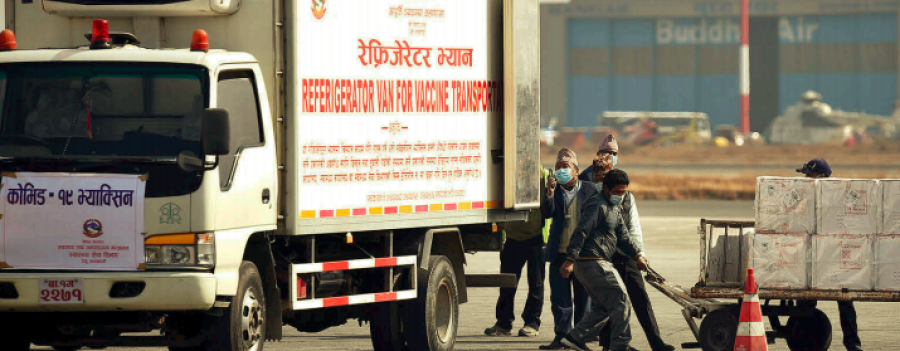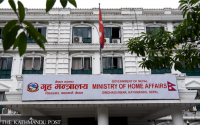National
How India is using vaccine diplomacy to recalibrate its neighbourhood first policy
Foreign policy watchers and experts say the jabs could prove for Delhi, which is in a bid to win over its neighbours, a shot in the arm.
Anil Giri
That India is the world’s largest producer of vaccines has become a tool for its diplomacy in the region at a time when its relationships with neighbours have not been at their best.
With Nepal, it has a border row but that has taken a backseat after it received a million doses of the coronavirus vaccine in a grant last week. Nepal will begin immunising frontline health workers on Wednesday.
But it is not just Nepal that the South Asian giant has been providing vaccines to.
According to the India’s Ministry of External Affairs since January 20, it has already shipped Covid-19 vaccines also to Bangladesh, Bhutan, Maldives, Mauritius, Seychelles and Myanmar and has received orders from several other countries.
Despite its own vaccination campaign, the largest in the world, it has chosen to share vaccines with other countries. This act has not just boosted India’s image but also injected positive momentum to its “troubled” neighbourhood first policy and some geopolitical components are reflected in this drive, leaders and experts have said.
“It looked good at a time when India was rolling out the vaccine for its population that it gave us too at the same time,” said Foreign Minister Pradeep Gyawali. “It has boosted their image and I must say this is generosity on part of the Indian government towards the people of Nepal.”
India started its immunisation campaign on January 16 and the million doses arrived in Nepal on January 21.
The Pune-based Serum Institute of India, the world’s largest vaccine manufacturer, has been manufacturing Covishield vaccines developed by the University of Oxford and pharmaceutical giant AstraZeneca.
India, China, the United States, Germany, the United Kingdom and Russia are producing the Covid-19 vaccines.
China too has been keen to provide the vaccine it has developed to the neighbourhood and has supplied it to Myanmar but given that India manufactures one that has proven efficacy and has the infrastructure to manufacture in large quantities, it seems to have been pipped by India in ‘vaccine diplomacy’.
Some observers see India’s reachout to the region and beyond through the Covid-19 vaccine has some geopolitical meaning to counter Chinese clout. Every country in South Asia is now doing business with China and it has emerged as a dominant player geopolitically giving a headache to the US and India to counter Beijing's rise, according to observers.
To this end, India and the US signed a strategically important pact in November. With the Covid-19 vaccine, that many world leaders call it “global public goods”, India has somehow managed to lessen China’s clout in the region, some observers say.
“This Indian attempt is to counter China and a strategy to keep the neighbourhood in its fold,” said Chandra Dev Bhatta, a Kathmandu based political analyst. “As China is engaging in multiple levels across the South Asian region, India was under pressure to counter it and its role in the region has been diminishing.”
Indian experts accept that the pandemic has indeed been an opportunity for India.
“Neighborhood first is our most important and principled foreign policy pillar for engagement in the region. We are stepping out during the pandemic to support others mostly in the developed and developing world,” Manjeev Singh Puri, former Indian ambassador to Nepal told the Post from New Delhi over the phone. “This India’s initiative has brought countries in the region closer to India. Besides sharing our scientific knowledge and production to the whole world, we also showcased how important our neighbours are to us.”
The gesture has been appreciated in Nepal.
“I thank Prime Minister Shri @narendramodi ji as well as the Government and people of India for the generous grant of one million doses of COVID vaccine to Nepal at this critical time when India is rolling out vaccination for it's [sic] own people,” Oli wrote on Twitter. “Nepal appreciates this gesture from a friendly neighbour.”
The Covishield vaccine is Nepal’s preferred choice as the country’s vaccine storage and transportation infrastructure supports it.
When Foreign Minister Gywali visited New Delhi between January 14 and 16, the issue of vaccines had come up.
“We sent diplomatic notes to various countries but in particular, we had sought Covid vaccine from India that would cover our 20 percent of our population,” Gyawali told the Post, “Of that, we do not know how much India will give us in a grant but we will seek to buy vaccine in subsidised rates if not possible to get free doses.”
Nepal has to inoculate 72 percent of its population of 30 million. Children below the age of 14, that make up 28 percent of the population, will not be inoculated as existing vaccines have not been tested on them. The India-made Covishield cannot be used on those below 18 as well because it has not been trialled on them.
Nepal is looking forward to getting vaccines to cover 20 percent of the population from the World Health Organisation’s COVAX programme and procure another 20 percent from the market, according to Gyawali.
“We were concerned about the efficacy of the vaccine, affordability, prompt delivery or easy to transport and compatible to our cold chain,” said an official on condition of anonymity. “Considering all these priorities, the vaccine produced by Serum Institute of India became our first choice due to our set condition and also because India was also willing to support us during the informal communications.”
For India this opportunity to support Nepal and other countries has become a chance to recalibrate its position in the region.
After Prime Minister Narendra Modi came in power in 2014, he propagated the idea of “neighbourhood first policy” but that had not been going well since due to India’s own policy dilemma and China’s outreach in South Asia.
“Providing Covid vaccine is a good gesture, helping out neighbuors in this difficult time is good and we should take it as a positive step of India,” former Nepali ambassador to India, Bhekh Bahadur Thapa, told the Post,
But there are other outstanding issues that the two countries have including that of the border. The border row had escalated after India built a road through the disputed Limpyadhura, Lipulekh and Kalapani area to the Kailash Mansarovar in the Tibet Autonomous Region of China in May last year and Nepal subsequently published a map showing the areas as part of its territory.
The submission of a report prepared by a bilateral Eminent Persons’ Group on Nepal-India relations, problems faced by India-funded projects in Nepal are other issues that need to be resolved.
India should brace up to resolve other outstanding issues with Nepal that will truly reflect and embody the meaning of “neighbourhood first policy”, say a section of experts.
“India should come forward to resolve the outstanding issues too,” said Thapa, who is the coordinator from the Nepali side in Eminent Person Group. “We have seen alignment and realignment of international forces in present time and new alignment and realignment are in process of making and unmaking. In this context, we want to see problems with India resolved as the relationship is heading towards a positive direction.”
Given the outstanding issues of the border among other matters, India had not been engaging with Nepal in the political front, as it did not want to be seen as an active political player in Nepal, but of late it has changed its strategy while dealing with Nepal, observed Bhatta.
“Anti-Indian sentiment is high in Nepal despite Indian support to us. So our ties are very delicate with India,” said Bhatta. “Under its ‘neighbourhood first policy’, Indian clout had not been that impressive but the Covid vaccine has given an opportunity for India to foster it. There now is realisation in India that it should improve its ties with Nepal but there should be limited political engagement.”
“They [Indians] will continue to be engaged in Nepal unlike in the past. They will not interfere in the internal political matters of Nepal, that has backfired on them,” Bhatta said.




 11.19°C Kathmandu
11.19°C Kathmandu














